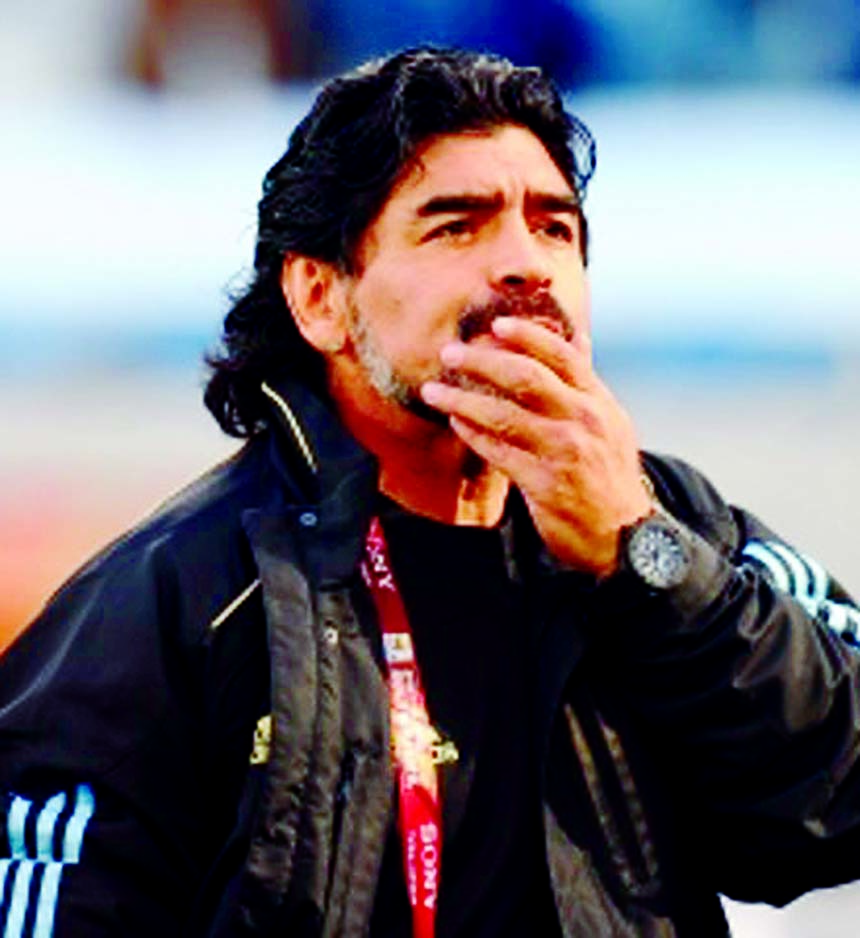
AFP, Buenos Aires :
Diego Maradona and Juan Roman Riquelme are back in the heart of the battle at their former club Boca Juniors, but this weekend they are playing political football.
Riquelme’s decision to join the opposition ticket in the election of the club board has added fuel to a heated campaign and reopened a feud with Maradona who aimed a broadside at his former team-mate.
The vote on Sunday is also shaping as a rematch of the recent Argentine presidential election.
The 80,000 Boca members can vote at the club’s famous Bonbonera stadium on Sunday in a ballot that could bring a second defeat for Mauricio Macri in less than two months.
Macri was president of Boca from 1995 to 2006 and used that as a springboard to national political success.
He became president of Argentina in 2015 at the head of his centre-right Cambiemos party. But his rule will end on December 10.
He was booted out of office in a national election on October 27, beaten by another Buenos Aires politician Alberto Fernandez, a centre-left candidate.
Boca has been run for the last eight years by Macri’s long-time ally Daniel Anglici, backed by Cambiemos members on the board.
The Macri faction’s candidate this time is Christian Gribaudo a former national deputy. His main challenger is a former Macri protege Jorge Amor Ameal, club president from 2008-11.
Riquelme, 41, is running with Ameal as candidate for the position of second vice-president.
Riquelme made his Boca debut in 1996 and soon replaced Maradona, who had returned to the club to finish his career. Riquelme also had a fractious relationship with Macri and feuded with Anglici.
Unlike Maradona, who won little at the club, Riquelme is associated with Boca’s greatest success.
The club’s last major international trophies came in 2007, when Riquelme scored three goals in a 5-0 aggregate win over Gremio in the Libertadores Cup final.
That was the club’s sixth victory in the competition, the last three with Riquelme in the team. He also led them to their last Intercontinental Cup victory in 2000.
Boca reached the Libertadores final again last year only to lose to hated rivals River Plate in a controversial final. River also eliminated Boca in this year’s semi-finals.
Coming close only to lose to their neighbours seems to have hurt deeply.
“I think it’s time to help my club, these last few years were the worst,” Riquelme told America TV.
When fans at the Bombonera chanted “Riqueeelme, Riqueeelme,” as the club drew 1-1 with Argentino Juniors last Saturday it was read as an electoral signal.
Riquelme made it clear that he thought the vote had a wider political significance: “The whole country knows that we have to win.”
Attempts to cash in on Riquelme’s popularity in the election have been blocked.
A photo showing his back, wearing the Boca number 10, was banned from the ballot paper. The club has warned that anyone wearing a Riquelme t-shirt on Sunday will not be allowed to vote.
Maradona, recently returned to Argentina to coach Gimnasia in nearby La Plata and the owner of a box at the Bombonera, reacted with hostility to Riquelme’s candidacy.
Riquelme snubbed Maradona, Argentina’s coach, by refusing to come out of retirement for the 2010 World Cup, making it clear the refusal was personal.
“We don’t agree much,” Riquelme said in late 2009. “My codes are not his and it’s clear that we can’t work together.”
Maradona warned that electing Riquelme would mean Daniel Passarella coming in as Boca coach.
“We don’t want a Passarella in Boca and if Riquelme wins, hold on,” Maradona said.
Passarella, a former River star who was the manager who dropped Maradona from the Argentina team, had a disastrous stint running Boca from 2009 to 2013 which ended in relegation.
A third Argentine icon Gabriel Batistuta is a more peripheral figure in the election, as he is in Boca history.
‘Batigol’ played just 30 games for the club in 1990-91 and is acting as a consultant to a third candidate Jose Beraldi.
“It’s an offer I’ve been waiting for,” said Batistuta adding that “politics don’t interest me.”

